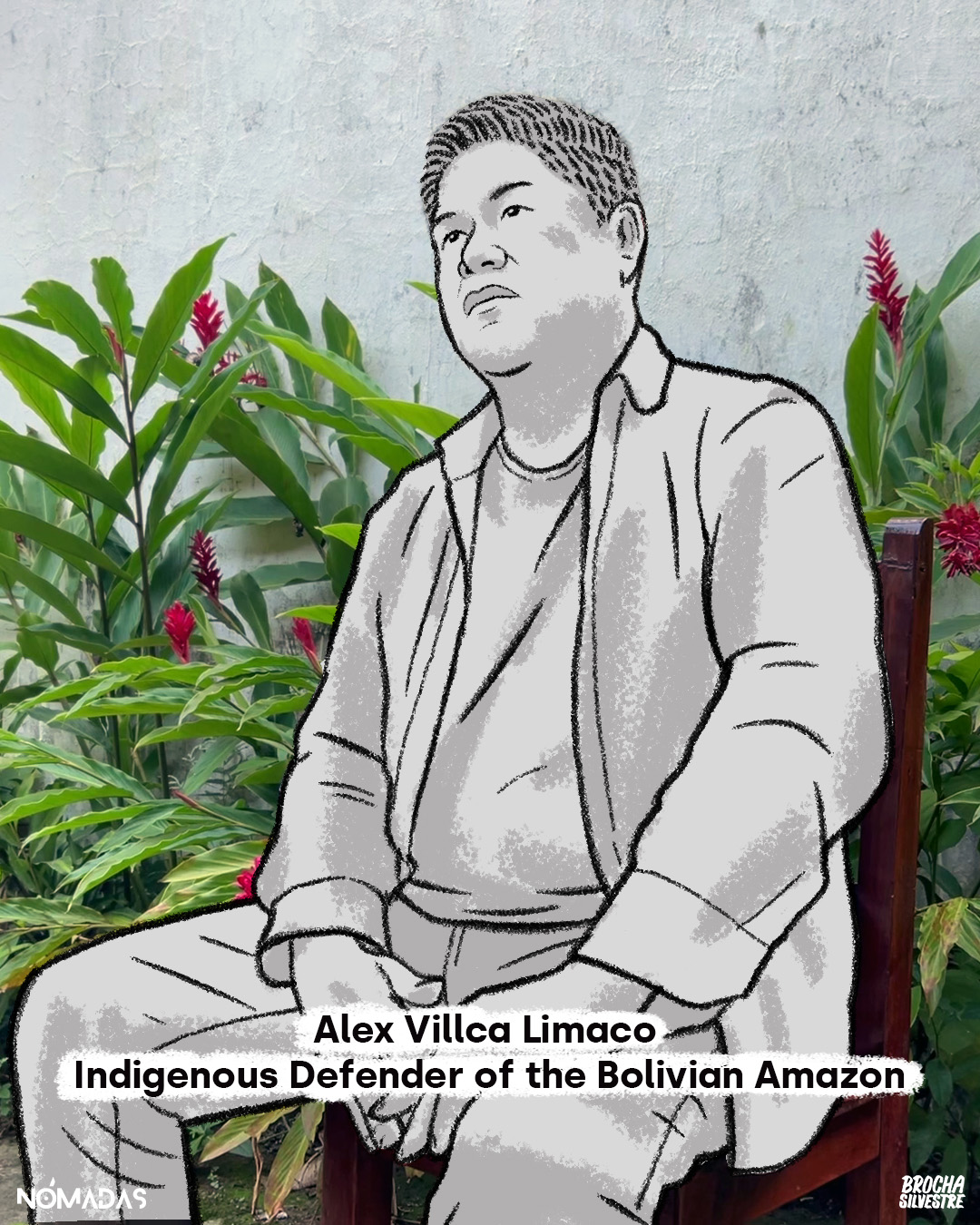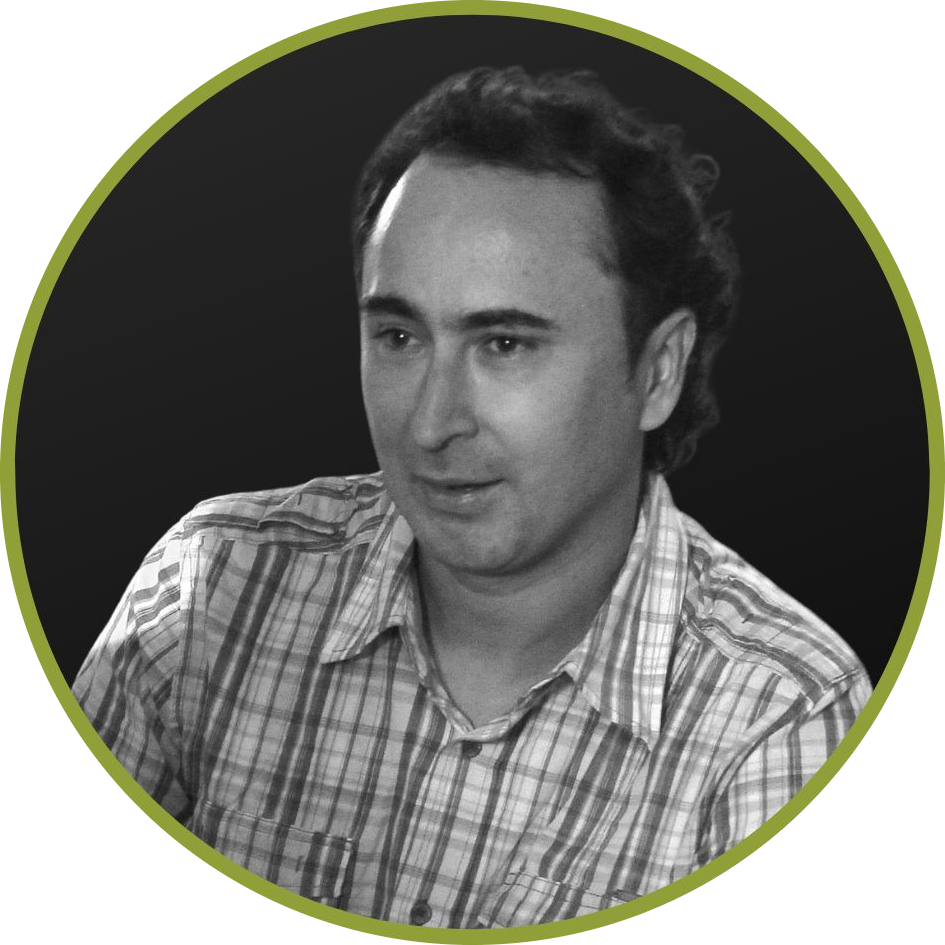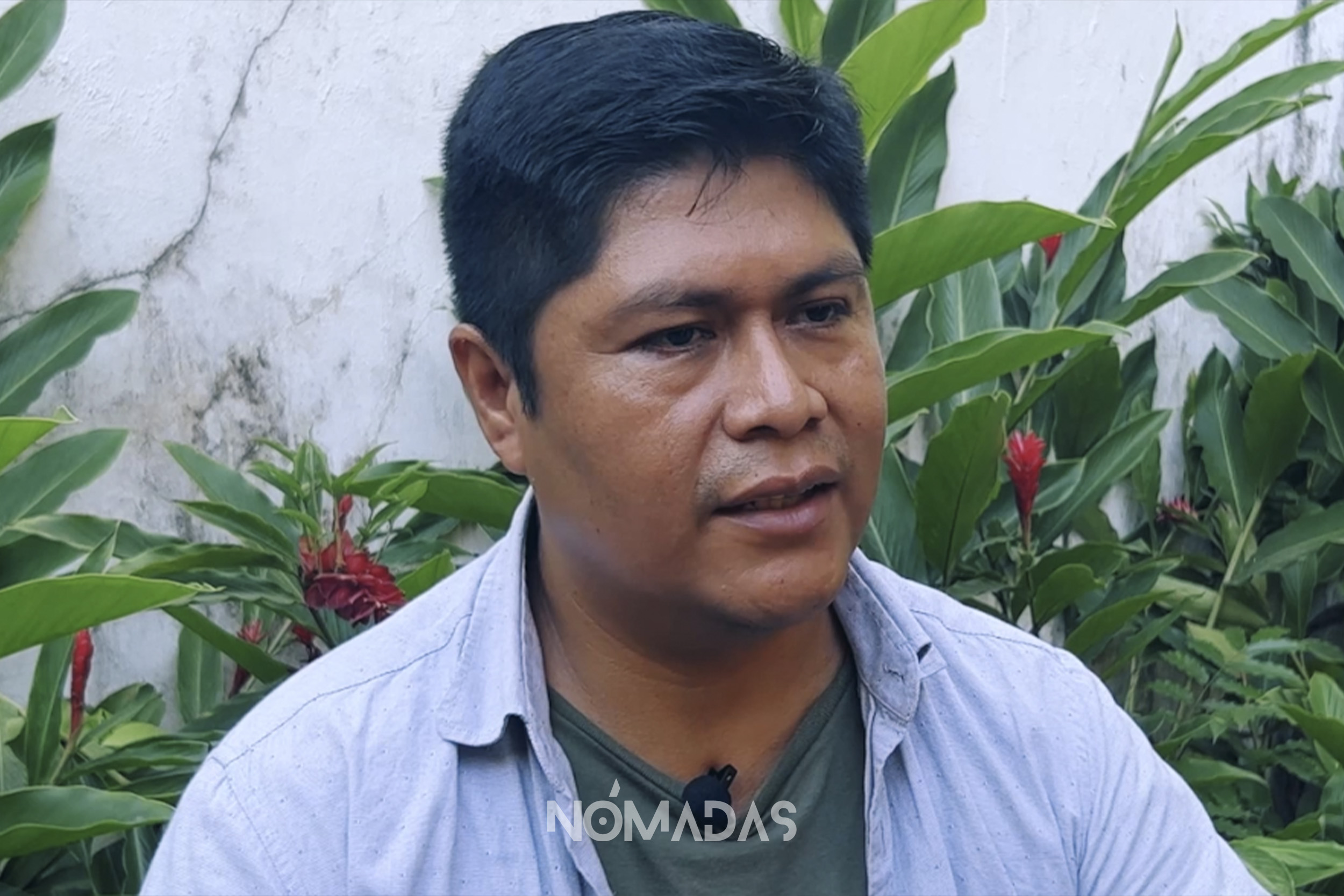ENGLISH


ENGLISH
INTERVIEW
Facing threats and limitations, Alex Villca Limaco combats powerful political and economic interests in a titanic struggle to defend the environment. Overnight, a blog appeared on the internet to discredit him and his family. But no attack against him stops Alex Villca Limaco.
August 21th, 2023


Roberto Navia Gabriel
Journalist
-How much does it cost to fight for the environment?
-It involves a lot of effort, dedication, and putting my physical integrity at risk, exposing my family, and also limiting certain aspirations that a community, a territory, or a region may have because often the role we, defenders, play comes with certain opposing ideas. We are stigmatized and labeled as opponents of development and the healthy aspirations of a territory, a community, or a country. It’s a constant, titanic struggle, facing powerful entities like politicians and economic interests. It’s an uneven battle, but we cannot step aside. It would be even sadder if there were no people willing to challenge and defend their rights, rights that are recognized in the Constitution or in international treaties and agreements. So, it costs a lot because one exposes oneself too much.
Being a nature defender involves a lot of effort, dedication, and exposing my physical integrity, as well as putting my family at risk. It also means limiting certain aspirations that a community, a territory, or a region might have.
-Have you ever been threatened?
-Yes, I have been discredited and stigmatized. They made it seem like defending the rights of indigenous peoples and nature means postponing many aspirations and opposing development. They also slandered me, claiming that I benefit from NGOs and that I take advantage of indigenous communities. They used social media on the internet, circulating a blog that spoke ill of me and my family, claiming that we benefit from cooperation and support organizations, which is completely false. Some relatives even expressed concern that I am exposing my family and my own life too much. My family runs an ecotourism business, which has also been threatened. They told me, «If you keep doing this, if you keep challenging the government’s actions or policies, you’re putting the family business at risk.» So, they put me in a difficult position, but my immediate family gave me their support to continue confronting this because I’m not taking actions that are detached from reality, but actions that are supported both by national and international norms. So, what I’m doing is revealing a reality, a truth.
-Did your family eventually understand the situation?
-Yes, they understood, but there’s still concern and fear, which is natural. We know that the threats will continue as long as we defend our rights because we’re touching political and economic interests. So, we have to deal with that, and it limits our ability to carry out our activities freely because there’s a mistrust that something might happen to us. However, I feel that there’s a greater power that is always present, and that’s what helps me in the task of fighting for and defending individual and collective rights. I don’t depend on just one person because often the power we have as individuals has limits, but there’s another power that emanates from nature and the cosmos, a power that is not visible. I have complete trust in that protection that doesn’t come from a person or a community but from something much greater. That’s my main support, and I feel that I’m fulfilling a mandate, a trust, a task that has been assigned to me. I feel that a higher power guides me and tells me to keep fighting.
-Does it have to do with something ancestral?
-Yes, it has to do with something ancestral. I come from a family where my grandfather, great-grandfather, and great-great-grandfather were spiritual guides. In fact, my great-grandfather, Francisco Navi, was the last shaman of the Uchupiamonas people. They had a much deeper understanding of the connection between humans and nature and the respect they have always had for Mother Nature. It’s a world that I’m still trying to understand and comprehend because it’s not that simple. Not everyone has the gift of such a profound understanding and comprehension. It’s a task that is acquired over time, and one gradually gains wisdom, understanding, and abilities.
-So, he has left a very important legacy that is reflected in your work. What precautions do you take to avoid the attacks of these enemies of nature?
-It’s essential to be prepared and knowledgeable about different subjects, to know what our Constitution says, as well as the international treaties and agreements regarding the rights of indigenous peoples and the rights of Mother Nature. We must remain vigilant in case of any eventuality or situation and delve deeper into the rights that indigenous peoples are entitled to. We need to know who is behind these actions and how they have developed this extractivist model. Obtaining this information is not that simple; it requires continuous reading and research. For example, with the threat of mining, which is very significant, I need to understand how it gained gravity and exerted great pressure, backed by legal norms and economic policies. So, I’m constantly challenged to stay informed and prepared.
Now with technology, I listen to workshops about indigenous peoples, the environment, and I keep enriching my knowledge. The media also helps to disseminate and make known the work we do. So, as we achieve progress and our role keeps growing, we protect ourselves. Without a doubt, one must understand what things are possible to do and what are not, as we unveil what is happening in the territories and now in our National Parks.
Many times, the role we defenders play comes with certain opposing ideas, we are stigmatized, and we are labeled as opponents of development, of the wholesome aspirations that a territory, a people, or a country might have.
-I imagine that violations and threats are considerable. Is there any observatory that records the violations suffered by environmental defenders?
-Yes, this is increasing, and I believe there is a huge challenge for civil society institutions because governments and large corporations are not interested in this issue since they are the ones causing the violence. So, who has to take on this task? It is us, the institutions on the other side, with a certain specialty or profile for this work. We, from the National Coordinator of Indigenous Native Peasant Land and Protected Areas Defense (CONTIOCAP), with the support of civil society and the Bolivia Center for Documentation and Information (CEDIB), have worked on the systematization of violence against defenders, and this has shown different levels of violence suffered by indigenous peoples, both verbal and psychological, quite significant and very complex, which has repercussions. We should not only consider disappearances or murders to denounce what happens to defenders.
In other countries, there are statistics of assassinations of leaders, such as in Colombia, Brazil, and Peru. These countries often witness this kind of violence, as well as in Central America, Honduras, and Mexico. For this reason, we make known these systematic violations suffered by indigenous peoples because we want to prevent Bolivia from reaching those levels of violence that are already happening in other countries.

The ancestral world gives strength to Alex Villca Limaco
– Considering the harsh reality, are you optimistic about the future, and what solutions can be proposed?
-I believe hope is the last thing to be lost, and we must convince ourselves that we don’t always depend on large masses to bring about change. Change can come from one person or a small group, and it’s crucial to start generating analysis, debate, and a wave of public opinion that draws attention to specific spaces, places, countries, or continents. Now, we face the challenge of changing direction.
The economic model that various governments have adopted, whether right-wing, left-wing, or centrist, all adhere to the same system. The rhetoric may change, but the model remains the same, and we have seen this in the Bolivian reality in recent years. Brazil has had extreme right-wing and socialist governments, but fundamentally, the economic model remains the same. As long as we believe that choosing one political ideology over another will bring about change, we will be lost. We must understand that change will not come from politicians because they constantly strive to maintain what they have built over time.
It’s important for us to begin changing from the smallest spaces and generate a significant impact in the long run. From there, I believe our country has great opportunities to move forward. The extractive economic model has shown us in over 500 years that it is not the solution. How can we keep insisting on something that has not brought about any change? We must try to transition to another model where we can make rational and sustainable use of the natural resources within our reach.
We need to think about what our ancestors did. There is an enormous challenge in seeking a balance between Western knowledge and what has been imposed upon us. The ancestral knowledge and wisdom that our peoples have had and still have, despite the oppression we have endured over the years, should not be considered inferior to Western knowledge. We must seek a balance that allows us to carry out responsible, sustainable, and harmonious actions with nature and the peoples who have inhabited these spaces for millennia. I believe that approach will yield greater benefits for the community.
– How is the health of the Amazon?
-It is in a very critical situation. It pains those of us who are taking action to raise awareness about this problem and make society and the international community understand the high risk that the Amazon biome and basin are facing because there seems to be no limit to the exploitation of its resources.
The activity is practically devastating everything and putting our Amazon at high risk of destruction. From this perspective, it is not surprising that researchers and experts are warning that the Amazon is reaching a point of no return.
This worries us greatly because in recent years, we have witnessed the level of destruction of our forests. In Bolivia, in 2019, enormous amounts of forests were lost, with reports indicating the loss of up to 6 million hectares in the Amazon, Chaco, and Chiquitania regions. Along with this, millions of plant and animal lives, as well as microorganisms, have been lost. All this destruction will slowly take its toll, and we will be condemned to live with contaminated soil and water, extreme climates of droughts and floods. We will be the ones who will suffer the consequences.
We are convinced that the Earth, Mother Nature, will continue with or without us. The problem is that we don’t understand that dimension, and we are causing this vital space to be destroyed. If we lose the Amazon, its scope and impact are global, not just for this region, but for the entire planet, as it regulates the atmosphere and provides freshwater on a global scale. Without these elements, the situation could worsen and become chaotic. Currently, we already see the loss of significant wetlands, such as several Ramsar sites, lakes, and lagoons.
But it’s not just the Amazon; if we look at other ecosystems, like the Andes, in the department of Oruro, we have lost another important lake, the Poopó. The water has evaporated due to human activities, and many times we try to blame natural phenomena, climate change, or global warming, without acknowledging that we, as humans, are the ones causing these consequences.
Unfortunately, those responsible for this massive destruction of the planet are the ones who have economic and political control, promoting a model that seeks to end all life on this planet. This is the situation, and we hope that more consciences can awaken.
Yes, I have been discredited and stigmatized, they made me see that advocating for the rights of indigenous peoples and nature means postponing many aspirations and opposing development. They also slandered me, saying that I am taking advantage of indigenous peoples.
– What is the daily life of Alex Villca Limaco like?
-For a long time, I have devoted my life to defending the rights of indigenous peoples, their right to the territory, and protecting Mother Nature. As the central government advanced with an extractive model and began implementing projects with significant impacts, I became more involved.
I remember the issue of hydroelectric projects, El Chepete and El Bala, in the Beni River basin. Simultaneously, extractive activities like mining, hydrocarbon exploitation, and agribusiness were also expanding, particularly in the Amazon, through deforestation, fires, and the expansion of cattle ranching.
Additionally, there were proposals for major infrastructure projects such as roads, bridges, and waterways in places of high fragility, such as rivers, protected areas, and indigenous territories. We started to raise awareness about this situation because they did not respect the minimal rights of indigenous peoples and Mother Nature.
There was no right to prior, free, and informed consultation, which is guaranteed by the constitutional law for indigenous peoples. They did not engage with indigenous communities, simply entering our territories and protected areas and notifying us of these projects through media outlets while continuing with their execution.
Many of these projects were declared of strategic national interest, and society and indigenous peoples were expected to comply with these decisions. This compelled me and several other defenders to speak out and make known these violations occurring in many places across our country.
– How do you approach your struggle, personally or institutionally?
-In 2015, I was appointed as the Secretary of Land and Natural Resources of the Uchupiamonas people for a year and a half. It was during that time that we began to challenge the extractivist economic policies of the central government, especially the idea of turning Bolivia into an energy hub through the construction of around twenty hydroelectric plants in our country. It was from that moment that I took on the challenge of demanding the fundamental rights of indigenous peoples and nature.
In this position, I had the opportunity to get to know more communities and villages, and I met the consortium of communities of the Beni, Tuichi, and Quiquibey rivers. In 2017, I was appointed as the Secretary of Communication and became the spokesperson for this struggle, representing 17 indigenous communities, which has now increased to 19.
By 2018, many resistance movements in our country were distributed across different departments, but they were not connected, just scattered. They came together in Tariquía to form the National Coordinator for the Defense of Indigenous, Native, and Peasant Territorial Rights and Protected Areas of Bolivia (CONTIOCAP). I was appointed as the national spokesperson for this network of resistance in Bolivia and took on more responsibilities.
Beyond these roles assigned from the territories or these emerging spaces, I am the one driving the demand for our rights to be upheld. Our collective rights as indigenous peoples are not being fulfilled, and the individual rights of each citizen in our country are being violated. We demand that the State, at all its levels, and the big corporations fulfill and respect our rights.
This interview is part of the Special: Bolivia’s Invisible Amazon and its guardians who do not give up, carried out by Revista Nómadas, with the support of the Amazon Rainforest Journalism Fund in partnership with the Pulitzer Center.
STAFF:
DIRECTOR: Roberto Navia. PRODUCTION MANAGER: Karina Segovia. PHOTOGRAPHS: Karina Segovia, Lisa Mirella Corti. SOUND PRODUCTION AND POST-PRODUCTION: Andrés Navia. ILLUSTRATIONS AND INFOGRAPHICS: Brocha Silvestre. SOCIAL MEDIA EDITOR: Lisa Mirella Corti. WEB DESIGN AND DEVELOPMENT: Richard Osinaga. COLLABORATION: Manuel Seoane, Diego Adriázola y Daniel Coimbra.
COPYRIGHT 2023
Te contamos desde el interior de los escenarios de la realidad, iluminados por el faro de la agenda propia, el texto bien labrado y la riqueza poética del audiovisual y de la narrativa sonora, combinaciones perfectas para sentir el corazón del medioambiente y de los anónimos del Planeta.
